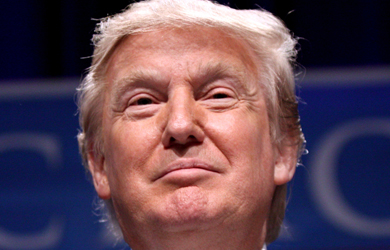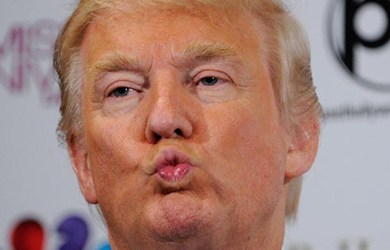Among the events hosted by right-wing groups during the Republican National Convention was “The Conservative Pit Stop,” sponsored by the American Conservative Union Foundation with an assist from its friends at the National Rifle Association. The ACU hosts the annual Conservative Political Action Conference, which attracts thousands of participants and a host of Republican officials.
The RNC event consisted of two panel discussions and a surprise keynote from vice presidential nominee Mike Pence. Among the speakers, on different panels, were U.S. senators from opposite ends of the Trump train: early Trump booster Jeff Sessions of Alabama and Utah’s Mike Lee, who was involved in the raucous, unsuccessful Day 1 effort to force a roll-call vote on the convention rules in an attempt to undermine Trump.
Also speaking: Fox News national security analyst KT McFarland, Heather Higgins of Independent Women’s Voice, GOP pollster Kellyanne Conway, Heritage Foundation VP for Policy Promotion Ed Corrigan, platform committee policy director Andrew Bremberg and former chairman of the Federal Election Commission Don McGahn, a Jones Day attorney who is the lawyer for Trump’s campaign.
The two questions formally on the table were “Will conservatives support Trump?” and “Can we reverse the Obama imperial presidency?” For these panelists, not surprisingly, the answers were “yes” and “yes.” Lee said it is in Trump’s power to win over Cruz supporters like him by adding to the campaign’s message a clear stand on reversing the trend of allowing the federal government and executive branch to accumulate too much power.
The Supreme Court was a major topic at the event, as it was throughout the convention, where the court was cited frequently as the ultimate reason for conservative voters to back Trump despite whatever qualms they might have.
Making that point most extensively was Trump counsel McGahn, who called the list of 11 potential Supreme Court nominees released by the Trump campaign the most important insight into how Trump will govern. “For those conservatives who are on the fence…I would counsel them to take a very hard look at this list and I would also counsel them to take a very hard look at what’s at stake in this election.”
McGahn said the list presents “a defining moment” and “a very, very, very clear choice for Americans.” It contains no moderate or “squishy” judges, he said, “no stealth candidates” and “no David Souters.” A number of them, he noted, clerked for Justice Clarence Thomas or the late Justice Antonin Scalia.
“Everyone on the list is already wearing a black robe,” McGhan said. He explained that there were a number of state Supreme Court justices on the list because many conservative “rising stars” whose age puts them in the “sweet spot” for a Supreme Court nomination are not on the federal bench:
Frankly, anyone in what I consider to be the sweet spot barely had an opportunity to be considered for chance to be considered for a federal court appointment in the last Republican administration so I think the rising stars who are conservative, conservative-libertarian, movement conservative, whatever one wants to label themselves, constitutionalist, textualist, etc., etc., are really going to be found on the state courts, simply because that’s where we are generationally.
McGahn did praise by name a few of the federal judges on the list, including William Pryor and Diane Sykes. And he mentioned state Supreme Court justices Allison Eid of Colorado and Don Willett of Texas, an anti-regulatory judge whose opinion in a Texas licensing case McGahn called “a manifesto on economic liberty we have not seen in our lifetime.”
Sessions also praised Trump’s “great list” of judges, saying it contains “no Souters or Kennedys.”
While everyone on the panel loved Trump’s list, the Heritage Foundation’s Corrigan had one more suggestion: In response to a question about what a President Trump should do on his first day in office, Corrigan suggested that he nominate Sen. Mike Lee to the Supreme Court. (Not long ago we discussed Lee’s extreme views about the Constitution.)
Trump’s list of potential Supreme Court nominees was reportedly drawn up with help from right-wing powerhouses the Federalist Society and Heritage Foundation. McGahn also seems to have played a role as Trump’s liaison to the conservative and Washington establishments in putting that list together; in his introduction, the ACU’s Dan Schneider said McGahn “gets a lot of credit for those 11 judges.” McGahn also reportedly helped broker Trump’s March meeting with GOP congressional leaders.
What do we know about McGahn? He is a partner at the Jones Day law firm. His uncle Paddy was an Atlantic City power broker who helped Trump cut real estate deals in that town. As a Republican appointee to the Federal Election Commission, McGahn actively resisted enforcement of campaign finance laws and sought to “chip away at election rules and regulations.” MSNBC’s Zachary Roth has said, “if you don’t like today’s almost-anything-goes campaign funding landscape, you can lay part of the blame on McGahn.”
McGahn has bragged that others have called his tenure “the most consequential of any commissioner.” Says Democratic FEC Commissioner Ellen Weintraub, “He was consequential like a sledgehammer was consequential. He did his best to undermine the law.”







